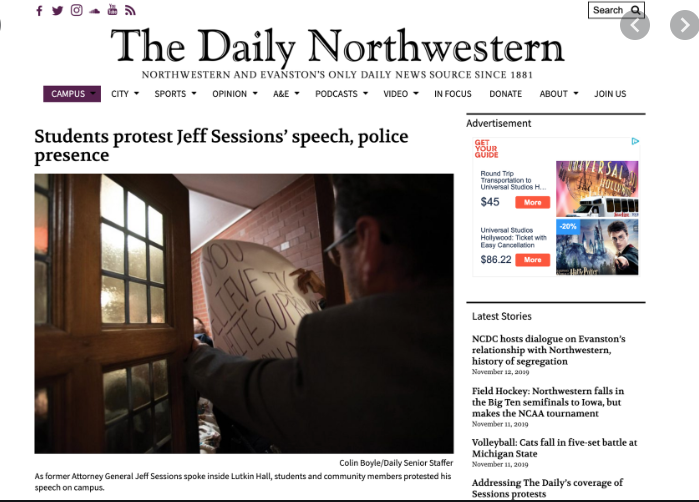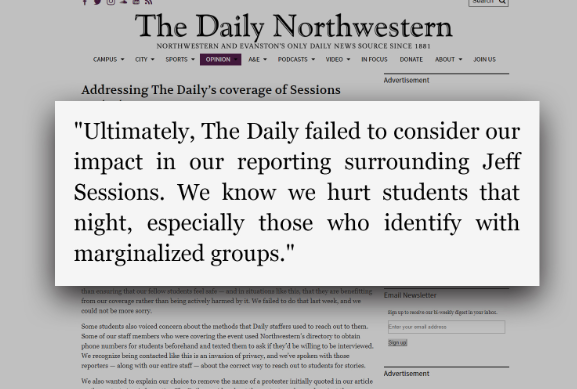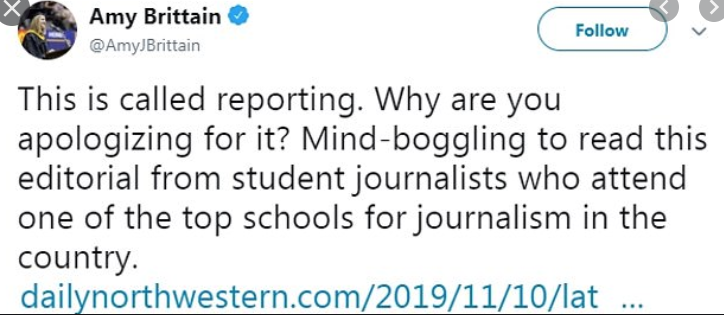Should Northwestern University’s student newspaper apologize for practicing journalism?
Written By Maxiene Cabo
edited by Hope Charles-Pierre
STT- In their nine-paragraph letter, in early November, the editorial staff at The Daily Northwestern student newspaper published a highly controversial apology. There was immediate backlash from veteran journalists. On behalf of journalism students and entry-level journalists, I want to offer an opinion:
On behalf of journalism students and entry-level journalists, I want to offer an opinion; APOLOGY NOT ACCEPTED.
The initial story was about student reporters at the school’s daily paper who covered a protest. They photographed and printed comments from protesters at a College Republicans event where former Attorney General Jeff Sessions was due to give a speech.

Sessions’ has a colorful history of establishing racist policies and making hateful comments about people of color and those from marginalized communities. He was instrumental in formulating Border-control rules to detain Mexican immigrants and also remove babies and children from their mothers. Reporters from The Daily attended the rally and published their article, along with photos and comments from those in attendance.
Afterward, the editors were criticized for violation of journalistic principles which included complaints about their lack of empathy. What? The students were criticized for exercising the five core principles of journalism- Truth/accuracy, Independence, Fairness/Impartiality, Humanity, and Accountability?
Critics also complained about the pictures posted on social media and the fact that reporters contacted them for further information. Again, what? Student journalists were wrong because they followed the Society of Professional Journalists’ (SPJ) code of ethics “that public enlightenment is the forerunner of justice and the foundation of democracy?”

These protesters were upset that their opinions were publicly outed by the reporters and argued that the actions of the newspaper were “retraumatizing and invasive.”
In response to these complaints, an apology letter was written and signed by editor-in-chief Troy Closson and eight other editors. In over 135 years of the student-run newspaper, Closson, is only the third black (editor-in-chief). In follow-up tweets, he offered an additional explanation.
“Being in this role and balancing coverage…on-campus with my racial identity – and knowing how our paper has historically failed students of color, and particularly black students has been incredibly challenging to navigate.”
This fact, that Closson is a young person of color on a predominately white campus may have played a major factor. Although he apparently followed all the rules of journalistic standards to ensure an unbiased story against a known, admitted racist this still led to an outcry from the community in Illinois. It is convenient and interesting that the outpour of criticism came during his tenure as editor.
Aside from the issue of racial prejudice against the editor, I believe that it’s extremely ignorant and hypocritical to think that these student journalists violated protestor’s personal space by reporting on a public event that was designed to reap attention. Why should students and entry-level journalists who are pragmatically applying what they have theoretically learned [about investigatory journalism] be forced to apologize?
Students are bound to make mistakes and step on some toes occasionally. That’s all part of the learning process. The mistake seemed to be the fact that the story made some people uncomfortable, but that does not equal untruth or inaccuracy. To make the editors issue an apology is ridiculous.
The letter expressed contrition for the photos and follow-up contact through the university’s directory. This criticism is confusing because the reporters apparently were practicing good journalistic techniques and tried to be as accurate as possible.
First, please keep in mind these student journalists were at a public event when these photos were taken, and this tactic is legal. Nothing is invasive about that.
Secondly, said protestors should not have attended the event if they knew the topics or people in attendance could bring back ill memories and emotions. The journalists at The Daily did not contribute to their traumatization; they were simply doing their job(s), just like any other professional.
Northwestern has one of the top journalism programs in the US and it’s discouraging to see that they pressured their student newspaper to apologize for covering a news event and contacting sources.
A tweet by David Boardman, dean of the Temple University media school stated, “As a journalist, a journalism educator and a First Amendment advocate, this editorial [apology] stuns me.” This clearly shows the university’s basic misunderstanding of how the world of journalism works, especially in today’s social climate.
The administration of Northwestern should have done more to support the students. By failing to condemn the public outcry and support their students, they suppressed the continuous flow of information. Disrupting the publication of news and pressuring journalists to apologize for doing their jobs sends a negative message to other journalists. These actions by the Northwestern administration may ultimately lead our generation into information chaos.
Journalists should not be punished for displaying reality at its rawest form or contacting those who participated in a major protest for interviews. Such actions are disturbing, at the very least.
If Northwestern continues on this path, then what is in store for the journalism majors at their university? According to Glenn Kessler, editor and chief writer of The Fact Checker “This is a travesty and an embarrassment.”
I firmly believe that those journalism students who were involved with this apology will look back years from now and regret what they did. They will understand once they get into their real careers, that journalists don’t apologize for doing their jobs.
…journalists don’t apologize for doing their jobs.
When you’re a good journalist you will always have to walk the thin line between truth-telling and empathy.
On behalf of students and entry-level journalists in the USVI and everywhere, note: APOLOGY NOT ACCEPTED.
Leave a Reply to SEO Referral Program Cancel reply